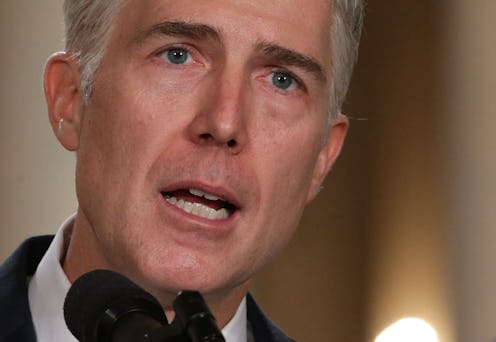News
Neil Gorsuch Once Defended Merrick Garland

President Trump has announced Neil Gorsuch as his pick to replace the Supreme Court seat formerly held by conservative Justice Antonin Scalia. Nearly a year ago President Obama also named a nominee for that vacated spot — Merrick Garland. But with a Republican-controlled Senate that refused to even consider Obama's pick, Garland earned the unwanted designation of enduring the longest gap between nomination and confirmation hearing in American history. With the election of Trump, the chance at a Senate hearing ended full stop for Garland. But interestingly, Gorsuch himself criticized the over-politicization of the confirmation process, name-checking none other than Merrick Garland.
The comment comes from a 2002 article Gorsuch penned following the funeral service for Supreme Court Justice Byron White. Writing for United Press International, Gorsuch called out the hyper-partisanship that too often dictated the confirmation hearings for seating judges and justices. Gorsuch had clerked for White, and noted that his former boss' Senate confirmation hearing lasted a grand total of 90 minutes. Partisanship didn't play much a role, as White was confirmed a mere two weeks following his nomination. Gorsuch compared that to the "grossly mistreated" Merrick Garland and John Roberts, who waited for over a year to be seated on the U.S. Court of Appeals in Washington, D.C.
Gorsuch lionized White for his commitment to being a true public servant, and the ensuing judicial independence that marked his Supreme Court tenure. White was the rare Justice whose vote neither party could take for granted. And it seems Gorsuch extended a similar respect to Merrick Garland, emphasizing that both he and John Roberts were "considered to be among the finest lawyers of their generation." The argument put forth by Gorsuch throughout the piece is that ruling on the legal merits of any case should not depend on one's personal politics. The courts in general, and the Supreme Court in particular, ought to be as free from partisan ideology as humanly possible. And Gorsuch seems to imply that Garland fit that description of an ideal judge:
"It would be a beneficent thing if Justice White's passing served as a wake-up call to both political parties that their responsibility in picking judges is to help the nation find objectively excellent public servants, not to turn the process into an ideological food fight where the most able are mistreated while trimmers and the mediocre are rewarded."
The conservative bona fides and circumstances preceding the nomination of Gorsuch are already causing many disaffected Democrats and their voters to vehemently oppose his confirmation. David Leonhardt at The New York Times argues that "as qualified as he may be," Democrats should oppose Gorsuch on the grounds that his nomination itself came about via a "constitutionally damaging power grab."
But whether this strategy can last for four years — not to mention the political repercussions of becoming the "obstructionists" Democrats have long criticized Republicans for being — remains an open question. But perhaps the greater question is if such partisanship continues unabated, will the United States ever again manage to confirm a Supreme Court Justice?
The desire for retribution runs strong in Washington, D.C. Yet Democrats have the chance to demonstrate their superior maturity and genuine commitment to country over party. Granting a confirmation hearing to Neil Gorsuch would show that not every politician need behave like a partisan Republican.